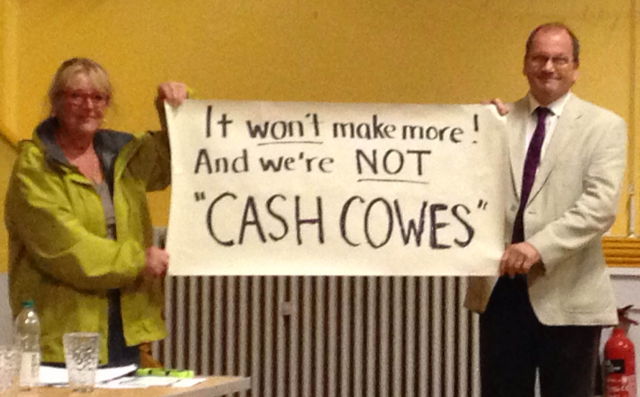Around 100 residents turned out for the public meeting organised by Cowes and East Cowes Town councils last night (Thursday) to hear about and share their views on proposals by the Isle of Wight council to introduce foot passenger fares on the Floating Bridge.
The meeting kicked off with a presentation from an East Cowes resident, who highlighted a series of facts about the floating bridge and summarised a number of flaws in the council’s calculations of how much income introducing foot passenger fares will raise each year.
Bridge runs at a profit
As previously reported through OnTheWight, the floating bridge currently makes a profit each year, paying for its own running as well as the surplus going towards other services around the Isle of Wight, such as street cleaning, beach cleaning, ground maintenance etc.
Those presenting were keen to point out that Islanders’ council tax DOES NOT contribute to the running of the floating bridge.
They argued that introducing foot passenger fares would be forcing a local tax on residents of Cowes and East Cowes. Adding that they’d be contributing to a service whose profits go towards supporting other services across the rest of the Island.
Due to confusion of figures from the council the amount of annual profit could not be reported accurately, but it was thought be be somewhere between £140,000 and £250,00 each year.
No attrition for foot passengers
According to the presentation, the council’s calculations did not allow for any attrition in relation to the foot passengers, ie. their calculations did not take into account that if charges were applied, foot passengers may not travel as often.
It was pointed out that attrition rates of around 20% were likely if charges were introduced and this would directly affect the well-being of local economy.
Could cost the council a huge amount
As has been reported through OnTheWight previously, it was suggested the council’s calculations had also not taken into account those with free bus passes who may choose to travel between Cowes and East Cowes (via Newport) by bus, instead of paying to use the floating bridge.
As the council pays for each journey pensioners with free bus passes make, one bus trip from East Cowes to Cowes and back again could cost the council around £12, plus the £1 they estimated they’d receive if the resident paid the 50p each way on the floating bridge.
Incorrect figures included in consultation
According to councillors later in the meeting, these arguments had been presented to the Isle of Wight council several times, but were informed the figures would not be changed until after the public consultation.
One councillor, opposed to the proposal, argued that by not correcting the figures before the consultation begins, residents will be giving their views without being in receipt of the full facts.
Figures “don’t stack up”
Geoff Lumley, IW councillor (Lab) for Newport East, told those present he’d also looked at the figures and agreed they “don’t stack up”.
He assured residents that in his capacity as chair of the Scrutiny Committee he would make sure that the consultation is closely looked at and the administration would be held to account.
Public have their say
The floor was opened to residents to ask questions.
Why are they raising the fares? Why did the council stop charging before? How can I afford to use my benefit money to take my child to school? Why are there 3-4 members of staff running the bridge? Why should we pay an unfair tax that benefits the rest of the Island? were just some of the questions raised.
Passionate plea from 15 year old
Fifteen year old Lana Viney from East Cowes spoke passionately about hers and other young people’s concerns over the proposed charges.
She recognised that under 18s would go free, but was worried that her mother – struggling to get by – would be hit by having to pay foot passenger charges.
Lack of leadership
Although there were several Isle of Wight councillors present at the meeting – Cllrs Baker-Smith, Hillard, Nicholson, Lumley, Ward and Peacey-Wilcox – Cllr Hillard was the only member of the council leadership present.
As the meeting drew to a close, residents were urged to make sure they told as many people as possible about the upcoming public consultation and to let the Isle of Wight council know their strength of feeling against the introduction of foot passenger fares.





